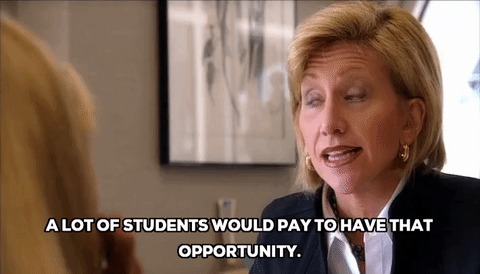Recently the Victoria and Albert Museum put up a job advert for an unpaid voluntary curatorial role. To land this job you needed, minimum, a masters degree and to be able to work for free.
Obviously as soon as this job advert went live, all of history Twitter protested.
And the V&A duly apologised, said the whole asking people to work for free thing, had been a huge mistake and took down the job advert.
Fantastic win right? Well, kind of, but it’s also something that happens everyday in the history and heritage sector, it’s just that this one time, it was caught.
But we can’t carry on staying quiet every other time this happens. Because our reliance on these voluntary roles will inevitably end up killing our sector.
Lets look at the average route into a paid role at a museum:
- Undergraduate degree (ideally from a top university and in a relevant subject)
- Postgraduate degree (again, top uni, relevant subject)
- Voluntary roles in museums/archives (for an unspecified time)
- Part time/low pay full time role (average 18k) possible volunteering on side
- Eventually land a full time paid role
Can you spot the problem here?

Now, lets not even start to focus on the whole, top university, masters degree minimum thing (though we do know that people from lower income, and also minority backgrounds are very much the minority; in terms of people attending these institutions)
BUT can we all agree that the industry is currently asking candidates to do a metric shit ton of free work, before they can even be considered for a job.
It is insanity and it is not ok!
By asking for so much free work, swathes of people are immediately being cut out.
It becomes not so much a matter of – who is the best for the role – and more a case of, who can afford to not get paid and still pay their rent and eat!
Spoiler: it’s probably not going to be the candidate from a minority or lower income background.

But it’s not just that it’s far from an even playing field.
History needs diversity to survive
There are two key reasons for this:
- People are interested in a more diverse look at history
- Museum visitor figures are falling. Too help tackle this, we need to start engaging with new audiences and communities.
Museums have to start hiring people with a diverse range of experiences. People that can research other annals of history, give a different perspective on well trodden ground and develop ways of bringing new communities to museums.
If history and heritage starts to do this, not only will it help ensure that we as sector survive; it will make history thrive.
But how can we actually do this?
Well, we need to ditch our dependance on voluntary roles.
Now I know nobody has a magical money tree, but we can’t have diversity if we don’t actually make museums a viable career for more people.
So lets wave bye bye to this attitude to free work:

Now thats out the way, lets say hello to:
Paid Internships and Apprenticeships!
Yup, you read that right. Paid. Minimum the living wage (£17k, and £20k for London)
By offering paid work, we’ll be able to access a broader pool of candidates than ever before. People who can bring something new and exciting to the table.
Plus we’ll actually be paying people for the hard work they do, and thats just basic ethics.
Apprenticeships can also help bring in people from the local community that maybe don’t have the degree, but that do have everything else you need to be an incredible curator, historian, conservator, etc.
Now, paying people means that budgets in other areas may need to be cut.
This is definatley something the bigger museums and heritage organisations can start to do, but understandably this isn’t something smaller museums can click their fingers and do overnight.
Long term budget changes will need to be planned out, grants may need to be applied for; it will be a ball ache and it will take a long time.
BUT it will be worth it.
We can’t keep on blocking out the future, just because we’ve always done something one way, doesn’t mean we should continue doing it… guys we work in history, we know this.
So, lets keep on calling for diversity. Lets call out bullshit free work job adverts. If you can, start a conversation about bringing in paid internships into your department. Go to local schools and communities and find ways to bring them into your museum.
History should be everyone’s story, it should be open to everyone and we need to start making that a reality; it’s just good business.
For more F Yeah History, check us out here on Twitter and Facebook.


I can’t understand why a big-budget institution like the V&A could think that even remotely acceptable. Glasgow Women’s Library currently has a project on equality in museums, including recruitment, see https://womenslibrary.org.uk/discover-our-projects/equality-in-progress/
LikeLike
Beamish Museum is another large operation where they use voluntary.
Last conversation I had with a manager at EH at Belsay – ‘don’t need to be interested in or know anything about history to work here, just need to sell it.’
I’d love to see more people from all backgrounds in museum work – passing on alternative knowledge pathways! So true.
LikeLike
There also seems to be a very top-down attitude in some museums. Maybe they should tap-into suggestions from entry-level workers and volunteers, after all these people are the ones working ‘at the coal-face’ with 1st hand experience of what the visitors need and want. It doesn’t matter how many degrees you have if you are out of touch with your customers.
LikeLike
This needs to be seen within the overall budget of the museum. It is quite common for institutions who want job-hopefuls to work for nothing to simultaneously hand out huge sums of money to outside consultants and contractors. The justification is that these organisations have expertise in areas they need. Really? So do your unpaid graduate volunteers! Clearly there is an opportunity for developing a wider skill-set in your (properly paid) recruits AND of cutting spending on costly consultants. The excuse that these are different areas of expertise doesn’t wash. If you work in a museum it is expected that you have a proven ability in research – so find out. Pay for initiative rather than for narrow specialism. People who are really good at one thing are generally good at many. Of course this also requires imagination and initiative in those doing the hiring…
LikeLiked by 2 people
I volunteered at the Brooklyn Museum a couple of years ago. It was fun, I got to do some library work and be a greeter for school kid visits and “opening night” evening events. One of the perks was being able to roam the museum for free and my scout troop got to visit on the cheap. It was fun. I also have an MSLIS degree, but no one is hiring. My internship was for the Children’s Aid Society and I gained some practical research experience, but as I said, no one is hiring. I think there should be some compensation for this kind of work.
LikeLiked by 1 person
I agree entirely, but this not just a history and museum problem. People are working for nothing in loads of careers – this needs to be stopped!
LikeLike
This is as much a problem in libraries as it is in museums
LikeLike
In South Africa, museums perpetuate this ‘unpaid labour’ practice by placing volunteers on ‘development phases’. 23 years after ushering in the young democracy, the museum landscape is utterly slow in empowering and integrating Black people into the sector. It is a matter of ‘transformation deferred’, no matter the sugar-coated terminology.
LikeLiked by 1 person
Gosh, this! I have written a similar post more relevant to my line of work ( living history, historical interpretation etc) a while back, saying exactly this. to thrive, museums need to be able to employ people with suitable skills, knowledge and dedication. obviously then need to be better founded too, but that is another step up into a quagmire that is currently our political situation….
LikeLiked by 1 person
Hi, can I translate it into another language, if it’s fine. The link to the original article will surely be noted.
LikeLike
Hi, do you want to drop us an email to discuss? fyeahhistoryblog@gmail.com
LikeLike
This is something that needs to be dealt with as a legal discriminatory issue. If opportunities in any workplace – especially publicly funded organisations – are only going to higher income groups who can afford not to be paid it is clearly discriminatory. A lot of these volunteers are young people just out of college. For low income parents who cannot (or should not) be expected to financially support their children as they start there careers their (low income) tax is going to institutions that are literally discriminating against their kids!!!!!!! A case of the lower classes subsidizing the lifestyles of the richer classes!!!!!!!!!! F… that.
LikeLike
Unpaid internships are a modern form of slavery. Graduates have enough debt without being expected to work for free. If the powers that be value education and want to have a reputation as a world leading society they should ensure that their citizens are properly rewarded for the work they do.
LikeLike
I completely agree with the sentiments. Expecting free work from anyone is bad enough but making it the only route to a chosen career is exploitative.
While you are looking at this, we need to also stop ‘free creative pitching’ in the heritage sector. Museums and local authorities usually ask designers to develop concept designs for galleries for free as part of their procurement process. This commits up to half a dozen companies to carry out thousands of pounds worth of free time. When you multiply this by the number of applicants it is usually tens of thousands of pounds and has in my time even added up to more than the budget of the project!! Clients should select their teams based on credentials, approach, experience and personalities and trust them to develop the work collaboratively once they are on board. This is a much more respectful way to procure professionals. The net result of free pitching is that consultants have to increase fees on paid work to make ends meet. However, the sector has been hammering fees down over the past ten years and fee scales have almost halved while expectations and legislation have increased workload. The hidden story is that many designers who are paid modest salaries have to work long into the evenings and sometimes at weekends to meet deadlines on a greater number of projects to bring in enough fees to meet the turnover required. This means tired staff and less attention to detail because the jobs just don’t pay. Quality of life suffers as does quality of work. The sector and in particular museums and local authorities as well as agencies such as English Heritage, CADW, the National Trust etc have a duty of care to safeguard the people they rely on to develop their exhibitions. They are a resource they can’t do without and they need to take care of them!
LikeLiked by 1 person
A fellow student drew my attention to this article after a discussion on UN library internships (2 months unpaid), and I agree with it on many points. Unpaid or low-paid work is common in many sectors today, which is terrible. I just caution against believing that only people who can afford it take on these roles. People are prepared to sacrifice a great deal for a chance (even food, a home, dignity…), which feeds into the false idea that this way of working and filling the workforce is all right, but it is sometimes the only way to be noticed, with the state of the economy, perceptions and prejudices and politics.
LikeLiked by 1 person
More than agree with you that not everyone who takes on paid internships/roles, is in a position where they can afford to do that. But nobody should ever be in a position where they have to sacrifice ‘food, a home, dignity’ for a shot at a job. Unpaid roles are slowly starting to become illegal in some sectors and frowned upon as incredibly bad practice in many other sectors. We need to start holding arts and charity organisations as accountable as any other business. Because no good business will ever be built on assuming that its staff will sacrifice their dignity for a shot.
LikeLiked by 1 person
I think you meant ‘everyone who takes on unpaid internships/roles’? Exactly, nobody should be in that position. Offering unpaid internships/roles has become predatory behaviour on the part of businesses because many people are left with few other choices, and it’s great that it’s being recognised as bad practice. I just hope it doesn’t get replaced by something equally bleak. –Looking forward to reading your blog in future.
LikeLiked by 1 person
If I might be permitted to add another comment: I totally agrre with Val that these internships are a form of Modern Day Slavery.
We need a logo/slogan that can be applied to guilty organisations – Slaves Work Here; We Use Slave Labour… or, as delivered to them in public ‘XYZ org: Pay Your Slaves’, ‘Free Workers : Not Fat-Cat Packages’.
Naming and shaming can be used to cut their revenue. In the case of public institutions the target is the paymaster, i.e. the Government. This might sound like a natural Labour cause, but I doubt it is a debate any political party want to be on the wrong side of.
Go to it – you have nothing to lose but your chains (logo idea!)
LikeLiked by 1 person
Museums are purvayers of colonial histories and thrive because of taking much for little or nothing – just like the former colonizing states that created them. And they have been the domain of mostly of the colonizer – so the sons and daughters of the gentry who need the money like I need another pair of socks with holes in them. But museums have been trying to reinvent themselves and that can’t happen without diverse voices and vision. Those who were colonized would rather dismantle those institutions but if they are to remain relevant in the 21st century and beyond they must recruit those diverse voices and vision in key roles who have the freedom to renew and reimagine those institutions. And that takes money. Money that is in the culture from the aforementioned pillaging. And even those newly formed museums created post-colonization can still trace their existence because of the stolen wealth. There are models of change – especially research museum attached to universities where there is at least stipends and grades for lowly paid students. But if the goal is knowledge – then those who bring knowledge to the world should be paid for their work. Anyways, interns in every profession should be paid, otherwise the sons and daughters of the rich will continue to be able to parlay their internships into positions of influence while regular schmoes will have to take minimum wage jobs while they pursue their fields of study.
LikeLike
Ironically it is almost exclusively in post-colonial powers – with culturally guilt-ridden PC institutions – that the historical revisionism takes hold. The ex-colonies themselves can’t wait to heave the artefacts of past ‘irrelevant’ and/or ‘blasphemous’ cultures into the skip, buy Manchester United shirts, and eat Kentucky Fried Chicken. Here we find it necessary to accomodate ‘other voices’ whether or not they are backed by any evidence. This leads to such stupidity as a fort on Hadrian’s Wall being given a plaque as a Black History site when its garrison were Moroccans – later to be active in the great Islamic slave trade in black Africans, and West Europeans. There is also a timidity in challenging ‘the Egyptians were black’ lobby. The ancient Egyptians certainly didn’t think so, and weren’t shy about saying so, but we’ll specially select and employ ethnic museum staff to come in and re-write history to suit their emotional needs. Let’s try to not overlook the conquests and exploitation performed by black African kingdoms; and the subjugation of the Middle East and large parts of Europe by the Arabs under the banner of Islam. In no way were these any better than the colonialism of Western powers.
LikeLike